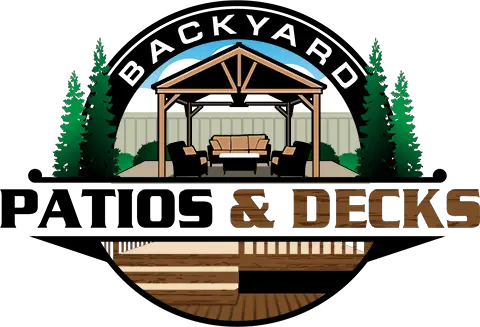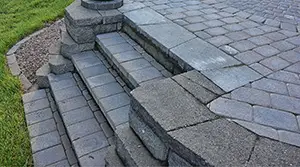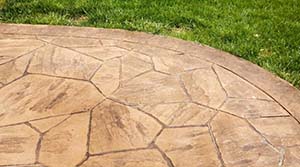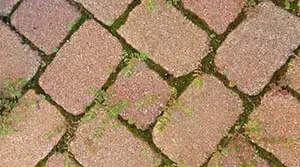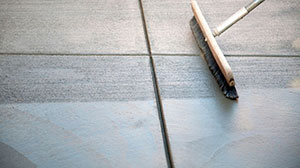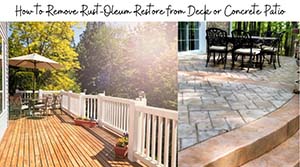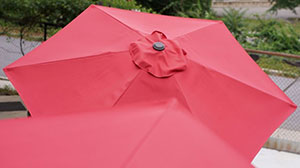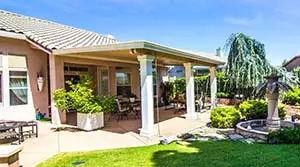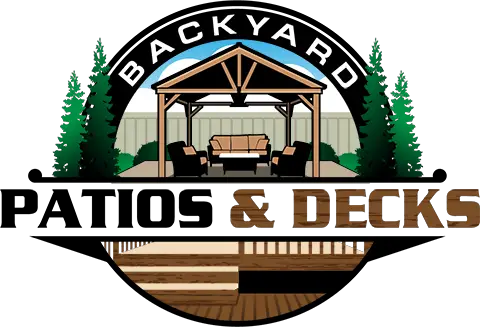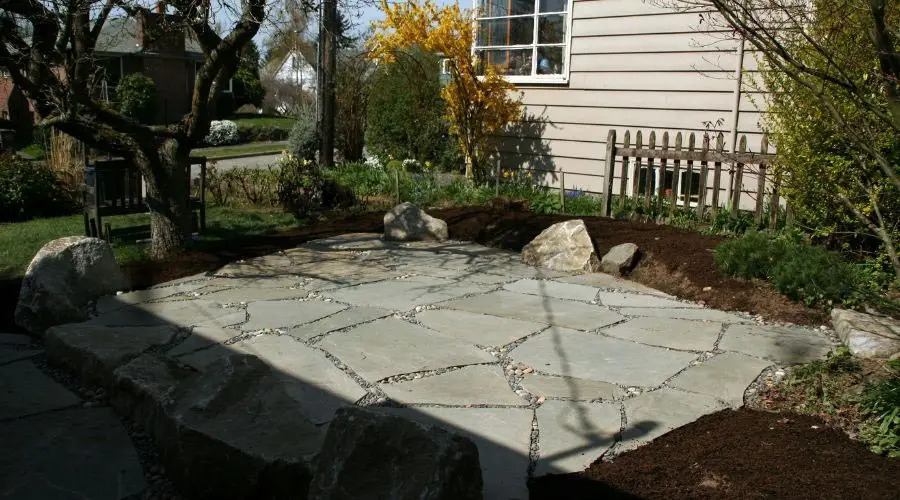
Many patio owners are asking whether they can clean and seal their flagstone patio. There are many options to clean your patio as well as apply a sealer to it. Patio owners are also asking if they should seal their flagstone and what sealers they should use.
Clean flagstone patios using a hose or by hand. We do not recommend that you use a power washer. Those who are not professionals should not seal their flagstone patio by themselves because they risk voiding the manufacturer’s warranty. Finally, professionals can seal flagstone patios and should use a penetrating sealer.
Read on to untangle the web of contradictory information about sealants and cleaning methods for flagstone patios.
What is the Best Thing to Clean Flagstone?
There are four different methods used to clean a flagstone patio. When cleaning your flagstone patio, you should consider the type of stone and how fragile it is.
Consider the composition of the flagstone patio when choosing a method. Some of these methods might harm the flagstone instead of helping it.
Each of the methods has its benefits and risks. Remember to weigh the risks and rewards of each before cleaning the patio.
| Method | Risks and Benefits |
|---|---|
| 1. Powerwasher | – Could cause the stone to chip – Environmentally Friendly |
| 2. Hand cleaning with stone detergent and water | Time-consuming |
| 3. Hand cleaning with dish soap and other chemicals | – Time-consuming – Many different substances – Costly |
| 4. Wire brush and hydrochloric acid | – Time-consuming – Use proper protection to prevent chemical burns – The acid might eat away at different types of stone |
Method 1: 3000 PSI Pressure Washer:
- Use a flagstone detergent and water mixture
- Move the 3000 PSI pressure washer head closer as needed, but don’t leave visible patterns
- Every dried-on substance, such as sap, will require the nozzle of the pressure water to be at a different distance
Method 2: Hand Cleaning with Stone Detergent & Water:
- Clean twice a year with stone detergent
- Use a “green” cleaning product if there is no internal draining system for the patio
- Mix stone detergent with water
- Spread the detergent and water mixture across the flagstone with a push broom
- Let stand for two minutes
- Scrub with a bush broom or wire brush to remove the stains
- Rinse the patio to see if there are other areas to clean
- If there are, repeat the cleaning process
- Let the patio set until it is entirely dry
- Rinse the push broom of the cleaner and use it to sweep the patio to remove loose debris
Method 3: Hand Cleaning with Dish Soap & Other Chemicals:
- Use a scrub brush with dish soap
- Use kerosene or ammonia for the heaviest cleaning
- Remove mold by using boiling water, white vinegar, or a UV bulb
Method 4: Use a Wire Brush & Hydrochloric Acid:
The final method is to scrub the stone by hand using a wire brush saturated with a mixture of water and hydrochloric acid.
Should a Flagstone Patio be Sealed?
Pros of Sealing Your Patio
Patio owners also ask whether they should seal their flagstone patio. Experts and contractors skilled at exterior construction say that you should proof your flagstone patio.
- Some of the expert reasonings are that sealing flagstone increases the time that your stones lasts and prevents mold and mildew from occurring.
- Not only that, but water, oil, and other abrasive materials sit on unsealed stones, which leaves them open to defects and gauges. A sealant protects them against this damage.
- Another benefit is that it provides your stone with a polished and glossy appearance. It also reduces stone dusting and deterioration. If you live in an area that produces snow, then sealant can prevent further damage to the coloring.
- Overall, without the sealant, the stones might turn yellow over time. However, the sealant prevents chemicals from getting into patio stone and could potentially save you thousands of dollars if the patio becomes “wrecked,” so to speak.
Cons of Sealing Your Patio
On the other hand, some experts say that you should seal a flagstone patio. Here are some of their reasons:
- Polymeric sand is not a good sealer.
- Sealants could trap moisture in.
- A glossy finish will make the surface more slippery.
Both experts agree that the sealant should be “breathable,” meaning water and other vapor can escape the stones, but moisture cannot get in. A breathable sealer will prevent damage within the stone that the owner usually will not see.
If you want to seal your patio, read on to discover the methods of preparing flagstone patios for a sealant and the best types of sealers to use.
How Do You Clean Flagstone Before Sealing?
If you decide to seal your flagstone patio, you must prepare it for sealing. Remember, the flagstone should be completely clean. If it is not, the debris on top of the stone will get trapped on the stone surface.
There are three methods to prep the flagstone before sealing it. All methods involve using a mild pH cleaner, a mild dishwashing detergent, or a stone detergent. You can mix the cleaner, dishwashing detergent, or stone detergent with water with the following exceptions:
- The dishwashing detergent should have no added acids, such as lemon or vinegar, especially when cleaning marble or limestone flagstone.
- The low pH cleaner is, therefore, more desirable since it has no extra acids.
- Scouring powders or creams should not be used since they could scratch the stone surface.
Some types of stone, especially marble or limestone, will be sensitive to acids. You should know what type of stone you are dealing with, how fragile it is, and whether acid will eat away at the stone surface. A low pH cleanser will not eat away at the acid-sensitive stone surfaces.
Next, use a mop to cover the surface with the solution. Finally, rinse and then dry with or without a cloth. You can also use a power washer or garden hose to apply the mixture.
What Should I Use to Seal a Flagstone Patio?
First, if you are a patio owner, you should not use anything. If an amateur uses sealant, it could void the product warranty. If you are a contractor, read on to discover the best sealers for the best types of sealers to use.
Experts overwhelmingly recommend that you seal a flagstone patio using a penetrating sealer, such as Spark Sigma.
These penetrating sealers will provide a boundary between moisture and the stone, effectively filling the defects in the stone surface and preventing further damage.
Silane Siloxane Sealer
Within this type of sealer, it is preferred by most to use a silane siloxane sealer. A silane siloxane sealer forms a hydrophobic barrier on the stone and repels water, causing it to bead up. It will allow vapor in and out, but not liquids.
The concrete should be dry before applying and then allowed to dry before using. The sealant will last around 12-20 years and fails when the cleaner eats away the barrier. If this happens, you can apply a new coat directly on top of the old one to replace it when it wears out.
To test a silane siloxane sealer, dribble water on the stone. The sealer is functioning correctly and preventing water from entering if the water beads up.
If it is a hot day and the stone has just gotten wet, you should also see steam coming off the stone surface. If you have applied the sealer and neither of these is happening, applying another coat is recommended.
A silane siloxane sealer has the following drawbacks:
- It releases vapors that are hazardous to your health.
- It is flammable.
- It is toxic to the environment.
Read on to find out more about silane siloxane and other types of sealers.
There are three silane siloxane sealants that we recommend:
| Sealer | Function | User Reviews |
|---|---|---|
| Ghostsheild Siloxa-Tek 8500 Penetrating Concrete Sealer | – Protection for moisture – Increases Durability of StoneWater – Beading Effects | – No water beading – Water gets absorbed almost immediately |
| Rain Guard CR 0356 Silane Siloxane Water Repellent Sealer | – Repels Water – Best for porous stone surfaces – Prevents weather, snow, salt, and rain damage | |
| Foundation Armor SX5000 DOT Approved Water Based Silane Siloxane Penetrating Concrete Sealer | – 10X protection for concrete – Long-lasting protection – Does not trap moisture beneath the surface |
Other Sealers You Can Use
You can also use other classes of sealers that you can use. However, we do not recommend these classes for various reasons:
| Sealant Type | Functions | Reasons We Don’t Recommend | Examples |
|---|---|---|---|
| Natural Stone Sealer | – Provides a natural stone matte. – Protects from cracking, spalling, and pitting. – Hydrophobic barrier. – Draws out the color for dry and faded surfaces. – Protects against intense sunlight and heavy rain. – Protects stone surfaces from substances that will sit on them, such as oils. | – Does not prevent etching – Will not water or oil-proof the stone – No sheen finish | – Foundation Armor WL 550 Matte Wet Look – Sealer Dominator Stone – Sealer and Clay Brick Sealer |
| Acrylic Concrete Sealer | – Provides a wet look or high-gloss finish – Enhances natural color – Toughens and protects the finish – Dries quickly – Interior and exterior use – It will last 1-3 years – Transparent, low sheen finish – Reduces dusting and deterioration – Adheres to both concrete and paver surfaces – Prevents stone yellowing – Protection from cracking, pitting, or salt stone damage – Non-glossy invisible coat finish – Repels water | – Moisture sensitive – Not breathable – Wears easily – No chemical reaction – More of a paint than a sealer – Can crack – Incompatible with some stones, usually only for cement | – Foundation Armor AR350 Wet Look Concrete and Paver Sealer – EnduraSeal 100% Acrylic “Wet Look” – Semi-Gloss Concrete Sealer – Masonry Defender Penetrating Concrete Driveway Sealer |
| Water and Solvent-Based Sealers | – Protects stone from water and stain damage – Water-based sealers protect from moisture damage – Solvent-based sealers protect from oil contaminants like grease – Protects from water, dirt, debris, stains, mildew, and moldShort drying time | – Solvent-based ones are primarily for outdoor use as toxic fumes and odors will be released when used – Low gloss – Have to reapply every six months | Glaze’ N Seal Clear Extra Strength |
Closing Thoughts
There are many different cleaning methods you can use to maintain flagstone patios. A power washer can chip the stone, but it is the fastest method.
Scrubbing by hand with a stone detergent is the most effective and safest method to clean flagstone surfaces. However, it also takes the most time. These processes are similar when it comes to prepping the flagstone patio for sealing.
Amateurs should not use sealant unless they do not have a problem voiding the product warranty. For contractors, the best type of sealant to use is silane-siloxane or any other sealer that says it allows the stones to “breathe.”
Choosing a “non-breathable” sealer will trap moisture inside the flagstones, similar to how some deck sealants trap moisture in the wood.
For sealants that are not silane siloxane-based, contractors should be careful and know the drawbacks. Many sealers will not protect from certain damages, while others will not give patio owners their desired finish. Others will require coatings to be applied to the patio multiple times a year.
Finally, each of the methods used to seal and clean a flagstone patio has pitfalls and benefits. Contractors and patio owners should weigh the risks and rewards of each before cleaning and sealing their flagstone patio.
While some may be cheaper to use, others will not prevent the damage to the flagstones and defeat the purpose of preventative sealing!
Sources
